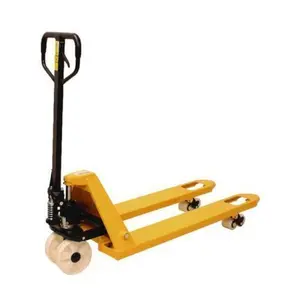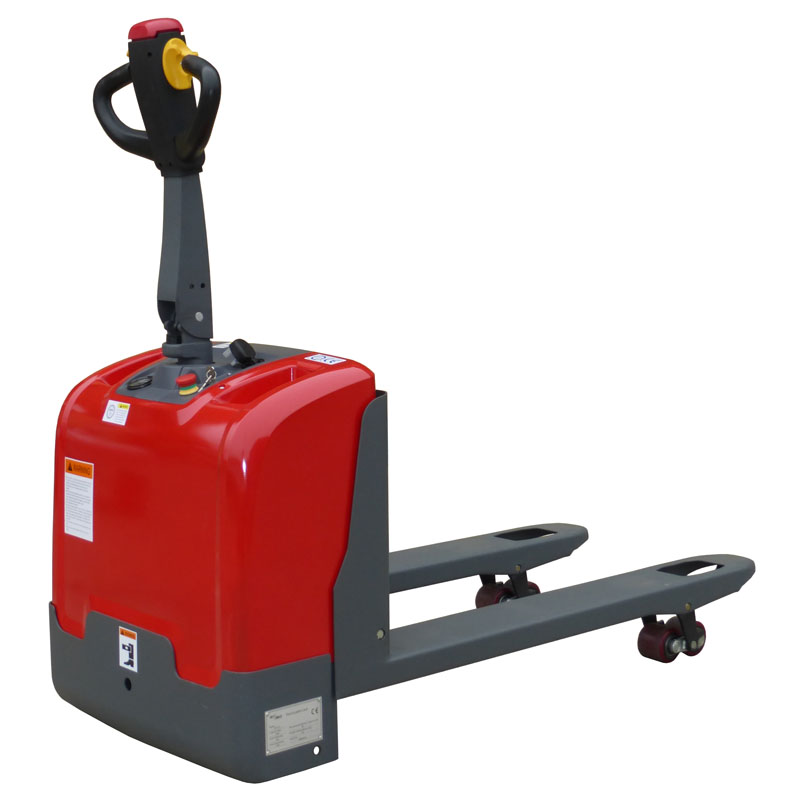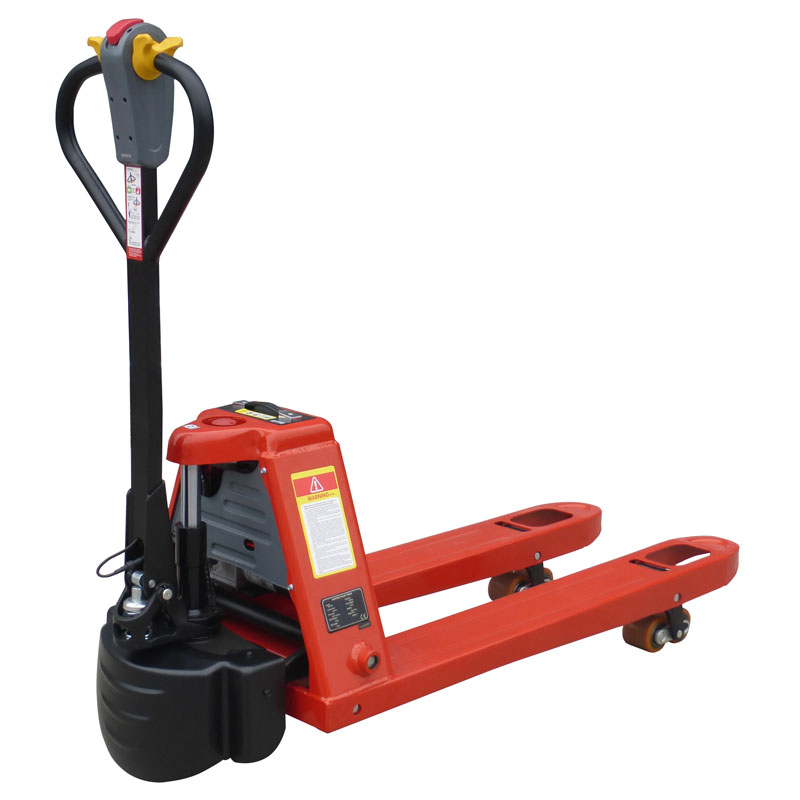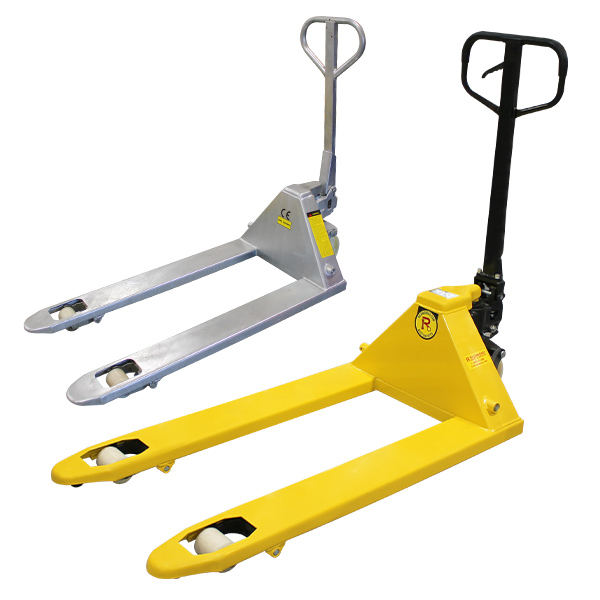Revolutionizing Material Handling: The Power and Efficiency of Pallet Trucks
Pallet trucks, also known as pallet jacks or pump trucks, are essential material handling tools designed to lift and move heavy palletized goods with ease. These devices consist of a wheeled carriage with forks that slide beneath pallets, enabling operators to effortlessly elevate and transport heavy loads. They come in various types, including manual, electric, rough terrain, and high-lift pallet trucks, catering to different industrial needs. Widely used in warehouses, retail, manufacturing, and distribution centers, pallet trucks streamline loading, unloading, and movement of goods, significantly improving efficiency, reducing physical strain on workers, and enhancing overall safety in material handling operations.
Types of Pallet Trucks.

In the bustling world of logistics and material handling, the pallet truck stands as an unsung hero, offering a robust and efficient means to transport heavy loads with ease. A pallet truck, also known as a pallet jack or pump truck, plays a pivotal role in warehouses, factories, and retail environments, streamlining the movement of goods and materials. This article aims to delve deep into the workings, types, applications, and the overarching significance of pallet trucks in the realm of material handling.
Understanding Pallet Trucks
Pallet trucks are simple yet highly effective devices designed for lifting and moving palletized materials. They consist of a wheeled carriage with forks to slide beneath pallets, enabling the operator to lift and transport them with minimal physical exertion. Operating on hydraulic principles, pallet trucks use a pump handle to raise the forks, allowing users to effortlessly maneuver heavy loads.
Types of Pallet Trucks
Pallet trucks come in various types and designs, each tailored to specific operational needs and environments. The different types of pallet trucks include:
- Manual Pallet Trucks:
- Standard Manual Pallet Trucks: These are the most common type and are operated by physical effort from the operator. They use a pump handle to lift pallets off the ground for movement.
- Electric Pallet Trucks:
- Rider Pallet Trucks: Powered by electricity, these trucks feature a platform for the operator to stand on and offer a higher load capacity, enabling more frequent and extensive use.
- Walkie Pallet Trucks: Similar to rider pallet trucks but operated by walking behind the equipment. They are ideal for transporting goods in smaller spaces.
- High Lift Pallet Trucks:
- Scissor Lift Pallet Trucks: These models offer a higher lifting height than standard pallet trucks, allowing pallets to be raised to increased heights. They are particularly useful for applications where extra lift is required.
- Rough Terrain Pallet Trucks:
- All-Terrain Pallet Trucks: Designed with larger, sturdier wheels, these trucks are suitable for navigating outdoor or uneven surfaces. They are often used in construction sites, gardens, and other rough terrains.
- Galvanized Pallet Trucks:
- Corrosion-Resistant Pallet Trucks: These trucks are specially coated to resist corrosion, making them ideal for use in damp or corrosive environments like cold storage facilities or chemical industries.
- Weighing Pallet Trucks:
- Integrated Scale Pallet Trucks: Equipped with built-in weighing scales, these trucks enable the weighing of loads while in the process of movement, streamlining inventory and shipping operations.
- Narrow Aisle Pallet Trucks:
- Articulating Pallet Trucks: Designed for narrow aisles, these trucks have a unique design allowing the forks to articulate, aiding in maneuvering in tight spaces.
- Pallet Stackers:
- Manual and Electric Stackers: These machines not only lift pallets but are capable of stacking them as well, providing a vertical solution for material handling.
- Pallet Jack Scales:
- Pallet Trucks with Integrated Weighing Systems: Similar to weighing pallet trucks, these models are designed to accurately weigh pallets while in motion, streamlining inventory management processes.

Applications and Significance
1. Warehouse Operations: Pallet trucks are an integral part of warehouse operations. They aid in the movement of goods within the facility, facilitating efficient loading and unloading processes. They contribute to time-saving and the prevention of physical strain for workers.
2. Retail and Distribution Centers: In retail environments, pallet trucks streamline the unloading of goods from delivery trucks and organize inventory within the store. Distribution centers rely on pallet trucks to move large volumes of products across various departments efficiently.
3. Manufacturing and Production: Pallet trucks assist in transporting raw materials to the production line and moving finished products for packaging and distribution, optimizing the manufacturing process.
Advantages of Pallet Trucks
- Efficiency: Pallet trucks streamline material handling processes, reducing the time and effort required to move goods, leading to increased productivity within warehouses, distribution centers, and manufacturing facilities.
- Cost-Effectiveness: They offer a cost-efficient solution for material handling, eliminating the need for larger, more expensive equipment. Their simplicity and effectiveness contribute to cost savings in the long run.
- Reduced Physical Strain: By mechanizing the lifting and transportation of heavy loads, pallet trucks minimize the physical strain on workers, reducing the risk of workplace injuries associated with manual lifting.
- Versatility: Pallet trucks come in various designs, accommodating different pallet sizes, weights, and environments. Their adaptability makes them suitable for a wide range of industries and applications.
- Safety Features: Most modern pallet trucks are equipped with safety features, such as brakes, ergonomic handles, and stability mechanisms, ensuring a safer working environment for operators and nearby personnel.
Disadvantages of Pallet Trucks
- Limited Weight Capacity: Manual pallet trucks, in particular, have limitations in terms of weight capacity. They may not be suitable for extremely heavy loads, requiring alternative or additional equipment.
- Manual Operation Limitations: Manual pallet trucks necessitate physical effort from the operator to lift and maneuver loads. This could be a disadvantage in high-volume operations or when constant movement is required.
- Maintenance Needs: Like any mechanical equipment, pallet trucks require regular maintenance to ensure optimal functionality. This can add to operational costs and downtime if maintenance is not conducted promptly.
- Terrain Limitations: Some types of pallet trucks, such as standard electric models, might not be suitable for rough terrains or uneven surfaces, limiting their use in outdoor or specific environments.
- Initial Investment: While they are cost-effective in the long term, the initial investment in acquiring pallet trucks, especially electric or specialized models, can be relatively high, requiring careful consideration for budget-conscious businesses.
Evolution and Technological Advancements
With technological advancements, the realm of pallet trucks has witnessed significant improvements. From the introduction of electric pallet trucks to the integration of IoT (Internet of Things) sensors for tracking and optimizing logistics operations, these innovations have further enhanced the efficiency and productivity of material handling processes.

Benefits of Pallet Trucks
Pallet trucks offer a multitude of benefits across diverse industries and material handling environments. Here are some of the key advantages:
- Enhanced Efficiency: Pallet trucks significantly expedite the movement of goods, contributing to increased operational efficiency. They streamline processes such as loading, unloading, and internal transport within warehouses, distribution centers, and manufacturing facilities.
- Cost Savings: Their simplicity and effectiveness result in cost savings. Pallet trucks serve as a cost-efficient alternative to larger, more expensive material handling equipment. They minimize the need for excessive labor and time, ultimately reducing operational costs.
- Improved Productivity: By reducing manual labor and streamlining tasks, pallet trucks increase overall productivity. Workers can efficiently handle and move larger quantities of goods, contributing to enhanced throughput and work completion rates.
- Minimized Physical Strain: These tools significantly reduce the physical strain on workers. By mechanizing the lifting and movement of heavy loads, pallet trucks decrease the risk of workplace injuries related to manual handling.
- Versatility: Pallet trucks come in various designs and models, catering to different types of pallets, weights, and operational environments. Their adaptability and versatility make them suitable for a wide array of industries and material handling needs.
- Safety Features: Modern pallet trucks often incorporate safety features such as brakes, ergonomic handles, and stability mechanisms, ensuring a safer work environment for operators and other personnel.
- Space Utilization: Pallet trucks enable efficient use of warehouse space by aiding in the compact storage and organized movement of goods, optimizing storage capacities.
- Quick Learning Curve: Operating pallet trucks is relatively easy, and training employees to use them effectively generally requires minimal time and resources.
- Environmental Impact: With the increase in efficiency and reduction of manual labor, pallet trucks indirectly contribute to a decrease in carbon emissions, supporting environmental sustainability within the logistics and material handling sector.
- Customization and Specialized Models: The availability of various types and specialized models, such as electric pallet trucks, high-lift pallet trucks, and rough terrain pallet trucks, allows businesses to choose equipment tailored to their specific operational needs.
Purpose of Pallet Trucks
The primary purpose of pallet trucks is to efficiently lift, move, and transport heavy palletized loads within various industries and material handling environments. These trucks are specifically designed to streamline the process of loading, unloading, and internal transportation of goods, enhancing overall operational efficiency. The core purposes of pallet trucks include:
- Material Movement: Pallet trucks are used to move palletized goods within warehouses, distribution centers, retail spaces, and manufacturing facilities. They expedite the transportation of materials, enhancing the workflow and reducing manual labor required for handling heavy loads.
- Loading and Unloading: They play a pivotal role in loading and unloading trucks, trailers, and containers. Pallet trucks efficiently lift loaded pallets to and from delivery vehicles, simplifying the transfer of goods between different transport modes.
- Warehousing Operations: Pallet trucks aid in the organization and management of inventory within warehouses. They help in arranging, stacking, and relocating goods, optimizing storage spaces and facilitating easy access to stored items.
- Optimizing Storage: By moving and organizing goods, pallet trucks contribute to efficient space utilization within warehouses, allowing for better inventory management and maximizing storage capacities.
- Improving Productivity: These trucks boost overall productivity by allowing workers to handle larger quantities of goods more quickly and with less physical exertion. This leads to increased throughput and faster completion of tasks.
- Reducing Physical Strain: Pallet trucks significantly decrease the physical strain on workers by mechanizing the lifting and movement of heavy loads, thereby minimizing the risk of workplace injuries related to manual handling.
- Supporting Diverse Industries: They are a versatile tool used in various industries such as logistics, manufacturing, retail, and distribution centers, offering customized solutions for different material handling needs.

Uses of Pallet Trucks
Pallet trucks serve a wide array of uses across numerous industries and material handling environments. Their versatility and functionality make them indispensable tools in streamlining operations. Some common uses of pallet trucks include:
- Warehousing Operations: Pallet trucks are extensively used in warehouses for transporting goods between storage locations. They aid in moving pallets of various sizes and weights, helping workers efficiently organize inventory and facilitating quicker access to stored items.
- Manufacturing Facilities: Within manufacturing plants, pallet trucks assist in moving raw materials to the production line and transporting finished products to storage or shipping areas. They streamline the flow of goods in the manufacturing process, contributing to enhanced productivity.
- Retail Environments: Pallet trucks are utilized in retail settings for unloading deliveries, stocking shelves, and rearranging inventory. They facilitate the movement of goods from storage areas to the sales floor, ensuring efficient product handling.
- Distribution Centers: In distribution facilities, pallet trucks aid in the sorting, organizing, and dispatching of goods to different locations within the center. They play a crucial role in the overall logistics process, helping to streamline distribution operations.
- Transportation of Heavy Loads: These trucks are specifically designed to lift and transport heavy loads, making them valuable in industries where large and heavy items need to be moved efficiently and safely.
- Outdoor and Rough Terrain Usage: Rough terrain pallet trucks are designed to handle uneven or outdoor surfaces, making them suitable for construction sites, garden centers, and other outdoor environments where standard pallet trucks may not be practical.
- Material Handling in Small Spaces: Pallet trucks are effective in navigating and maneuvering within tight or confined spaces where larger machinery might not be able to operate efficiently.
- Emergency Situations: Pallet trucks can also be utilized during emergency situations for quickly moving materials or supplies to necessary areas.
- Various Pallet Sizes: They accommodate different pallet sizes and configurations, offering flexibility in handling various types of goods and materials.
Environmental Impact on Pallet Trucks
The environmental impact of pallet trucks, like most machinery, spans multiple dimensions. While they contribute to efficiency and streamlined material handling, their impact on the environment includes both positive and negative aspects:
Positive Environmental Impact
- Energy Efficiency: Modern electric pallet trucks are designed for energy efficiency. They operate on electric power, which might derive from more sustainable sources compared to fossil fuels, reducing overall carbon emissions.
- Reduced Emissions: Electric pallet trucks emit fewer pollutants compared to their internal combustion engine counterparts. This reduction in emissions is beneficial in indoor environments and contributes to overall air quality.
- Productivity Improvement: By streamlining material handling processes and reducing the need for manual labor, pallet trucks contribute to increased productivity. This efficiency improvement can potentially lead to reduced operational hours and energy use.
- Optimized Space Utilization: Pallet trucks facilitate organized storage within warehouses and distribution centers, optimizing space usage. This can reduce the need for additional storage facilities, potentially conserving land and resources.
Negative Environmental Impact
- Manufacturing and Disposal: The production of pallet trucks involves the use of raw materials, energy, and resources. Additionally, at the end of their lifecycle, there can be environmental implications if not disposed of properly.
- Battery Disposal: Electric pallet trucks rely on batteries which, when disposed of incorrectly, can pose an environmental hazard due to their chemical components. However, advancements in recycling technology have made battery disposal more sustainable.
- Energy Source Impact: While electric pallet trucks may be more environmentally friendly during operation, the source of the electricity used (which might be derived from non-renewable sources) impacts their overall carbon footprint.
- Maintenance and Repair: Regular maintenance and repair of pallet trucks are essential for their optimal performance. This maintenance often involves the use of various materials and chemicals, which can potentially impact the environment if not managed responsibly.

Frequently Asked Questions (FAQ)
What is a pallet truck?
A pallet truck, also known as a pallet jack or pump truck, is a manual or electric-powered tool used to lift and move pallets within warehouses, factories, distribution centers, and various other material handling environments. Its primary function is to efficiently transport heavy or bulky goods that are arranged on pallets.
The basic structure of a pallet truck consists of a wheeled carriage with forks that slide beneath the pallet. The operator uses a hydraulic pump or electric-powered mechanism to raise the forks, elevating the pallet slightly off the ground. This lifting action allows the pallet and its load to be easily maneuvered or transported across short distances.
What is another name for a pallet truck?
Another name for a pallet truck is a "pallet jack." The terms "pallet truck" and "pallet jack" are often used interchangeably to refer to the same material handling equipment designed for lifting and moving pallets within warehouses, distribution centers, and other industrial settings. Both terms describe the wheeled device with forks used to lift and transport palletized loads efficiently.
What is a Palletized truck?
A "palletized truck" typically refers to a commercial truck or a vehicle that has been adapted or designed to accommodate the transportation of goods on pallets. These trucks are specifically configured to handle palletized loads, making them a common mode of transport in the logistics and freight industry.
The term "palletized truck" can refer to different types of trucks used for transporting palletized goods:
- Flatbed Trucks: These trucks have a flat, open trailer without sides or a roof. They are often used for transporting larger or irregularly shaped loads placed on pallets.
- Box Trucks: Enclosed trucks with a box-shaped cargo area often have a flat floor to accommodate palletized goods. They are commonly used for local or regional delivery of palletized goods.
- Semi-Trailer Trucks: Often used for long-haul transportation, semi-trailer trucks have the capacity to carry numerous pallets. They are commonly used for larger shipments over significant distances.
What is the difference between a pallet truck and a hand truck?
The primary difference between a pallet truck and a hand truck lies in their design, functionality, and the type of loads they are intended to handle:
- Pallet Truck (Pallet Jack):
- Functionality: Pallet trucks, also known as pallet jacks, are specifically designed for lifting and moving palletized goods within warehouses, distribution centers, and industrial settings. They feature forks that slide beneath the pallet and are operated by either a manual pump handle or electric-powered mechanisms to lift and transport pallets.
- Usage: Pallet trucks are ideal for moving heavy pallet loads, typically within a confined area or a facility, allowing for efficient loading, unloading, and internal transport of goods on pallets.
- Hand Truck (Dolly):
- Functionality: Hand trucks, also referred to as dollies, are designed for transporting individual items or smaller loads. They feature a vertical frame with a small platform, wheels, and handles to move single items or smaller boxes.
- Usage: Hand trucks are versatile for various applications such as moving boxes, appliances, and other single items. They are commonly used for delivery services, in retail environments, or for moving items within households.

Is a pallet truck a forklift?
A pallet truck, commonly known as a pallet jack or pump truck, is not the same as a forklift, although both are used for material handling within industrial and warehouse settings.
Here are the primary differences between a pallet truck and a forklift:
- Pallet Truck (Pallet Jack):
- Functionality: Pallet trucks are designed specifically for lifting and moving palletized loads horizontally. They consist of a wheeled carriage with forks that slide beneath pallets, allowing for the lifting and transportation of loads within a limited area.
- Operation: Pallet trucks are typically operated manually using a pump handle to raise the forks. Some models are also electrically powered for increased efficiency.
- Forklift:
- Functionality: Forklifts, on the other hand, are more versatile machines designed for lifting, stacking, and transporting materials vertically as well as horizontally. They can lift loads to greater heights, stack materials in racking systems, and maneuver in larger spaces.
- Operation: Forklifts are powered vehicles that operate with hydraulic systems, allowing operators to raise, lower, and transport heavy loads using forks attached to the front.
Pallet trucks, despite their unassuming appearance, serve as the backbone of material handling across various industries. From their simple manual forms to the more advanced electric models, these devices have revolutionized the way materials are transported, offering efficiency, safety, and cost-effectiveness. As technology continues to evolve, the pallet truck is likely to undergo further refinements, cementing its role as an indispensable tool in the logistics and material handling landscape. The significance of these unassuming yet powerful machines is undeniable, shaping the way we handle and move goods in the modern world.



